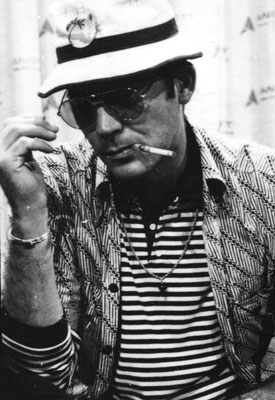
It’s been more than three years since legendary gonzo journalist Hunter S. Thompson shot himself in the head with a .45 caliber pistol inside his Woody Creek, Colorado, compound. In his wake, a considerable flood of tributes have bled forth in all forms of media. Here are the required gonzo goods.
1) On the big screen: Academy Award-winning documentarian Alex Gibney’s Gonzo: The Life and Work of Hunter S. Thompson is considered the most exhaustive, entertaining, and enlightening film on the writer. Featuring interviews with all the big players in Thompson’s life, narration by friend and imitator Johnny Depp, and forgotten footage and photographs from the past 50 years, it tells the whole Freak Power story, from Louisville to Owl Farm, with stops in Hells Angel-land, Vegas, Africa, and along the 1972 presidential campaign trail. It screens at UCSB’s Campbell Hall on Thursday, November 6, at 7:30 p.m.
2) On the page: Two compendiums of Thompson’s work are also about to hit shelves: The Mutineer: Rants, Ravings, and Missives from the Mountaintop, 1977-2005, which will unveil certain corners of his life during the time that he stopped being able to meet deadlines, and Fear and Loathing at Rolling Stone: The Essential Hunter S. Thompson, which will feature his best magazine work. And then there’s Hunter S. Thompson: The Glory Years, a portrait of the writer offering intimate views of his life by Jay Cowan, a longtime friend and former caretaker at Owl Farm. Being touted as the best biography yet, it will also feature never-before-seen photographs, so prepare for the March 2009 release.
3) In your ears: Thompson was known for making audio tapes of his inner thoughts and story ideas, which he would then transcribe onto the written page. After his suicide, director Alex Gibney and others were allowed to search his basement and pick the best of the lot, and The Gonzo Tapes-stretching from 1965 to 1975-is the product of that. Including such seminal recordings as his Hells Angels and Vegas work, as well as unknown interludes, such as the time he tried cocaine for a Rolling Stone article on Sigmund Freud (which never got finished) or the fleeting days he spent in Saigon at the end of the Vietnam War. It’s a fascinating document for any Hunter fan, and it’s in stores now.



